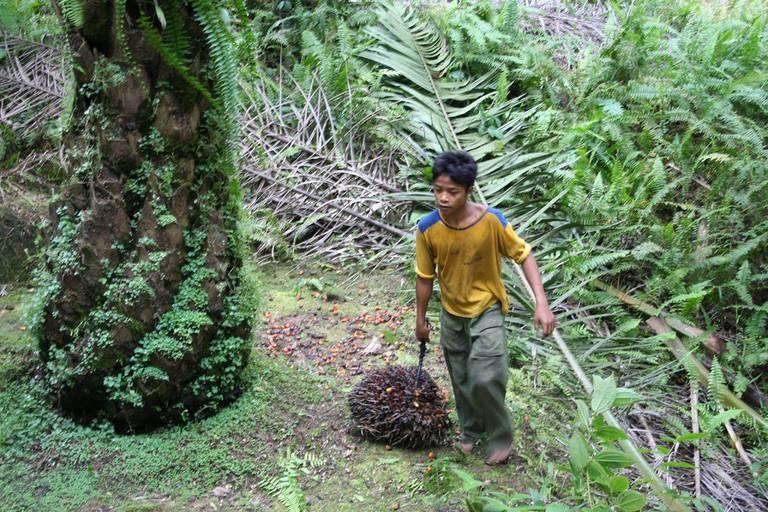
A searing report released last week by Rainforest Action Network (RAN) lambasts PepsiCo for what it calls the “reckless destruction” of both rain forests and communities in Indonesia.
RAN’s researchers mined Indonesian customs data that they say reveals connections between the global snack and beverage giant and several of the largest importers of palm oil to the U.S. That report follows a survey RAN released only days earlier, which it says highlights the connections some of the world’s largest banks have to PepsiCo and, by association, mounting deforestation and human rights violations.
From RAN’s point of view, PepsiCo -- which has continued a spree of acquisitions as part of an aggressive growth plan worldwide – is earning billions of dollars by profiting from what NGOs frequently call “conflict palm oil.”
The global palm oil industry, thanks to some successful self-policing measures such as RSPO (the Roundtable on Sustainable Palm Oil), has indeed achieved progress on ensuring this coveted ingredient is sourced more sustainably. But according to RAN, some companies including Indofood, which has a joint venture with PepsiCo in Indonesia, are responsible for the destruction of carbon-dense peatlands while failing to respect basic human rights. Meanwhile, the NGO also accused PepsiCo of facilitating the exports of even more palm oil to the U.S., with much of that supply responsible for continued child labor violations and land rights abuses.
RAN insists it has been lobbying PepsiCo for a while in an effort to push the company to transform its palm oil supply chain. “PepsiCo has been engaged by hundreds of thousands of emails, online petitions, phone calls, written letters and on-the-ground actions from supporters of the campaign,” Emma Lierley, a communications manager with RAN, told TriplePundit. “And over the past three years, our team has had extensive engagement with their sustainability team on these issues as well.”
The NGO said it has held lengthy discussions with PepsiCo’s sustainability team as the NGO attempted to convince the company to skirt any connections to conflict palm oil. Last year, during PepsiCo’s annual shareholder meeting, a representative from the Indonesian labor organization OPPUK called on the company’s CEO, Indra Nooyi, to work with Indofood in order to change the labor and environmental practices on the company’s palm oil plantations. But a year later, RAN insists that nothing has changed on that front.
“PepsiCo is well aware of the issues surrounding Indofood and its palm oil supply chain,” Lierley said, “but continues to source from that company without consequence.”
As of press time, PepsiCo did not respond to 3p’s request for comment on RAN’s accusation. The company publicly posts what it calls its key sustainable palm oil commitments, which were last updated in October 2015.
Other NGOs have been supportive of RAN’s continued pressure on PepsiCo. Deborah Lapidus, a campaign director with the NGO Mighty Earth, told 3p that Indofood is one of the largest remaining producers in Indonesia that still has not adopted the High Carbon Stock Approach methodology to identify valuable forests. She also said the supplier continues to be exposed for labor rights violations.
“I think the worst thing about Pepsi’s palm oil supply chain is its ongoing [joint venture] with Indofood,” Lapidus told us. “Its recent update to its palm oil policy fell far short of the benchmark, so I think pressure on Pepsi vis a vis its [joint venture partner] is fully warranted.”
RAN’s report lists the top 10 palm oil exporters to the U.S., and outlines what it determined are the ties to PepsiCo. One of these exporters is the controversial IOI Group, a founding member of the RSPO. The Indonesian company generated headlines last year for suing the RSPO in a Swiss court after the organization rescinded the company’s membership following a study that linked it to repeated destruction of peatlands and rain forests across Indonesia.
Those allegations soon prompted Unilever to sever ties with IOI. After global outrage continued to grow and more companies dropped IOI as a supplier, IOI then dropped its lawsuit.
But despite IOI’s pledge to clean up its operations, RAN and other NGOs have accused the company of additional labor violations. And while PepsiCo has not confirmed or denied any links to IOI publicly, RAN suspects the food and beverage giant has indirect ties to the producer via its relationship with Wilmar, which in the past had been a PepsiCo palm oil supplier.
While RAN continues to call out PepsiCo for its relationships with companies such as Indofood and IOI, established or otherwise, Greenpeace has suspended its campaign against the latter palm oil giant. Last Friday, Greenpeace declared that IOI made a “significant commitment” to tackle deforestation and human exploitation within its supply chain. Greenpeace lauded IOI for agreeing to a one-year period during which the company will be audited by a third party that will verify these changes.
RAN, however, is not convinced. Shortly after Greenpeace announced its truce with IOI, RAN issued a statement that sums up IOI’s commitments as too little and too late. "IOI has started to make progress addressing the egregious and far-reaching impacts of its palm oil business,” said RAN’s Gemma Tillack, “but its statement today overplays the progress made, especially on key human rights issues.”
Image credit: Wakx/Flickr

Leon Kaye has written for 3p since 2010 and become executive editor in 2018. His previous work includes writing for the Guardian as well as other online and print publications. In addition, he's worked in sales executive roles within technology and financial research companies, as well as for a public relations firm, for which he consulted with one of the globe’s leading sustainability initiatives. Currently living in Central California, he’s traveled to 70-plus countries and has lived and worked in South Korea, the United Arab Emirates and Uruguay.
Leon’s an alum of Fresno State, the University of Maryland, Baltimore County and the University of Southern California's Marshall Business School. He enjoys traveling abroad as well as exploring California’s Central Coast and the Sierra Nevadas.














